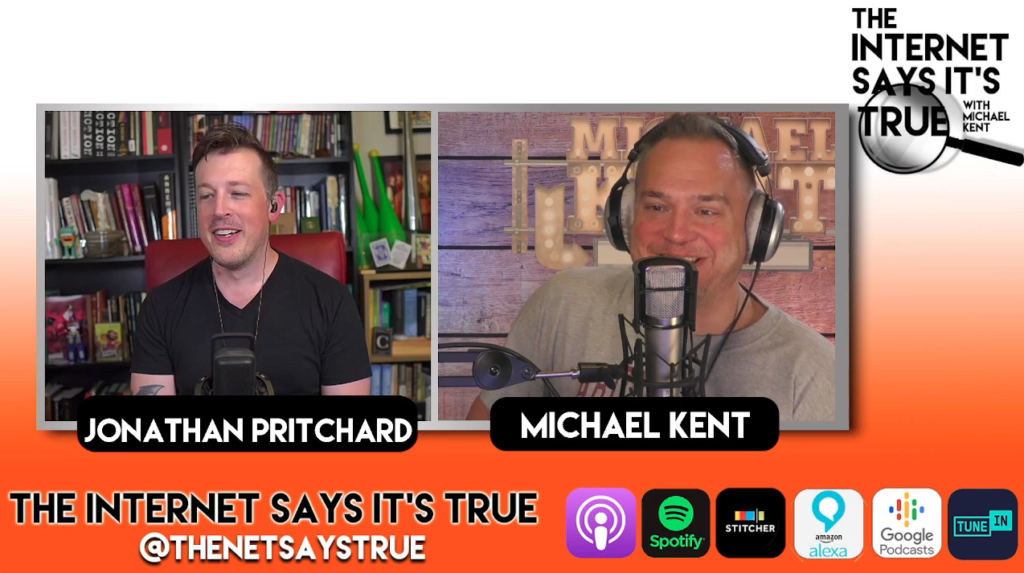Miraculous Sniffers: Smelling Parkinsons
Joy Milne found that her husband had a particular smell. Something she couldn’t place, but something that was off. It turns out that Joy could actually smell his Parkinson’s Disease long before he was ever diagnosed. In this episode, we talk about how both dogs and humans can sniff out illness in an almost miraculous way! Then we chat with Mentalist, Author and Speaker Jonathan Pritchard.

Dogs are amazing. And one of the areas where they’re better than us – in addition to always being happy to see people – is in their sense of smell. And it’s not even close. A dog’s nose is somewhere between 10,000 and 100,000 times more sensitive than a human nose. And the part of their brain that detects scent is around 40x more sensitive than the corresponding part in a human. They can pick up a scent at one-part per trillion. That’s like a single drop of a liquid in 20 olympic-size swimming pools.
So while this helps them with things they were bred to do, like hunting and ratting, at some point, people figured out they could work together with dogs to put them to work for us. We’ve all seen bomb sniffing dogs, drug sniffing dogs and dogs that help locate people in rubble, but beginning in 1989, dogs started being used to help sniff out illness.
The first dog to smell illness was in 1989 when a dog kept sniffing a mole on its owner’s leg. The mole turned out to be melanoma. This launched a ton of studies about dogs and their ability to sniff out ailments in humans. When dogs were put to a test as part of an academic study, dogs generally scored between 90 and 99 percent accuracy when asked to sniff out clothes worn by cancer patients. The illnesses that dogs can sniff out best are cancers and bacterial infections.
When a dog smells something like cake, they don’t just smell cake like you and I. They’re able to smell the ingredients in the food. So what is it that they’re smelling when they alert us to a medical condition? Well these types of conditions change the chemicals in the body. We might secrete more of a particular type of enzyme or compound. Tumors tend to produce volatile compounds in the body that get released into urine, saliva, sweat and breath. And this is where it’s important to remember how a dog can sniff out a single drop of a substance in 20 giant swimming pools. So if there’s something different about that scent, whether it be sweat, or breath or whatever, they can pick up on it.
And for this reason, we’ve learned a lot about the early detection of these diseases. But can a human be trained to sniff out these types of things?
Well that brings us to Joy Milne and her husband.
Joy Milne thought her husband smelled like wood. Over the years, he had developed a strange, musty, earthy wooden smell that she couldn’t place. He wasn’t wearing a new cologne and he didn’t used to have this scent. It wasn’t the most pleasant scent, and she took notice. When she fell in love with her husband Les, she loved the way he smelled. So this was a big change for her and something that she constantly brought up to him.
The couple, who lived in Perth, a town north Edinburg, Scotland, had been married for decades and this was a new problem for them. 12 years later, Les was diagnosed with Parkinson’s Disease and when they went to a Parkinson’s support group, something shook Joy to her core. Everyone at that meeting had Les’s distinctive musty smell. She was actually smelling the Parkinson’s.
In Joy’s training as a nurse, and as the daughter of a nurse, she was taught to recognize certain smells. There are the obvious ones, like a soiled bed or alcohol on the breath. But there are other less obvious smells like a Urinary Tract Infection, which reportedly has a very distinctive smell. Despite knowing that she had a sort of internal scent library that could help lead her toward helping patients, she never knew that the scent she was smelling for 12 years on her husband was Parkinson’s until that support group meeting. Then it hit her like a ton of bricks. It was obvious to her at that point.
Obviously the news that Les had been diagnosed with Parkinson’s was horrific. The central nervous system disease is one of the worst ways to die and sadly, Les passed away in 2015. But the contribution that Joy’s gift was able to give to medicine has had long-lasting effects and has launched studies around the world.
See, Joy Milne’s gift of smell is something that only a few people in the world have been blessed with. And the science of it is fascinating. What Joy was smelling on her husband, and on those other Parkinson’s patients in the support group was Sebum. It’s an oil produced by the body. We all have sebum. When you rub your finger along the side of your nose and you feel that oil, or if you go too long without shampooing and you feel oil in your hair. That’s sebum. And in particular, the sebum of a Parkinson’s patient contains 10 different compounds linked to Parkinsons. They’re volatile organic compounds produced as waste products of an abnormal metabolism. At this point, I could list what some of these volatile organic compounds are – hippuric acid, eicosane, and octadecanal to name a few, but reading through some of the scientific journals, I got in absolutely over my head. I don’t know what any of these things are. Just know that there’s something very special about this as it pertains to Parkinsons.
And that is – there is no ONE definitive test for Parkinsons. And analyzing the smell of a patient and recognizing these VOCs – volatile organic compounds – gives doctors an indication of Parkinson’s LONG before any other diagnosable symptoms. So Doctors started working with Milne, who is now helping them using her super sniffer to honor her late husband and to help future Parkinson’s patients. They’ve taken swabs from Parkinson’s patients and – just like in testing the canines – they’ve given the samples to Joy to sniff and she’s able to identify the Parkinson’s patients 100% of the time. But how does this help? Joy is an older woman and won’t be around forever to help diagnose patients around the world.
This is where we learn about an electronic nose. There are machines that can sniff for compounds once they know what they’re looking for. And scientists have developed a mass spectrometer to basically do what Joy is doing with her nose. Now that they know the specific biomarkers, scientists and doctors are well on their way to being able to diagnose Parkinson’s Disease much sooner.
So next time you’re on the subway and you smell someone nasty, instead of thinking the worst, maybe just sit back and wonder – maybe you could be the next Joy Milne. Maybe you have a super sniffer, picking up the scent of some new undiagnosed disease. The Internet says it’s true!

Review this podcast at https://podcasts.apple.com/us/podcast/the-internet-says-it-s-true/id1530853589
Bonus episodes and content available at http://Patreon.com/MichaelKent
For special discounts and links to our sponsors, visit http://theinternetsaysitstrue.com/deals

